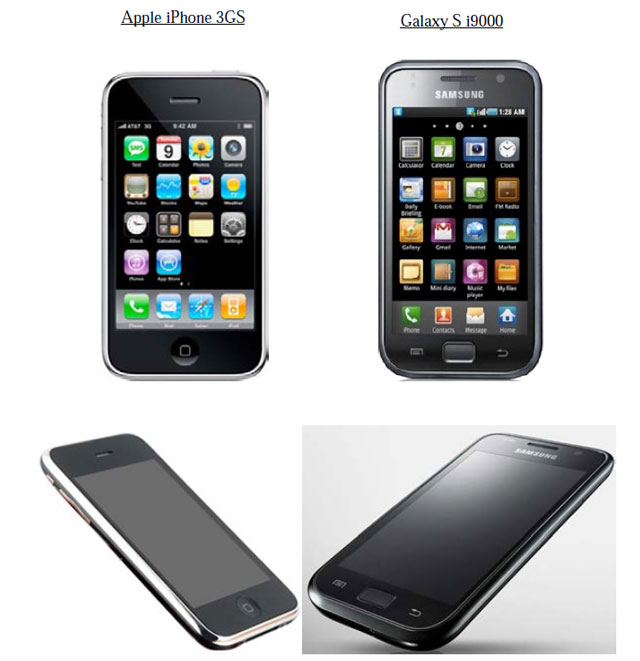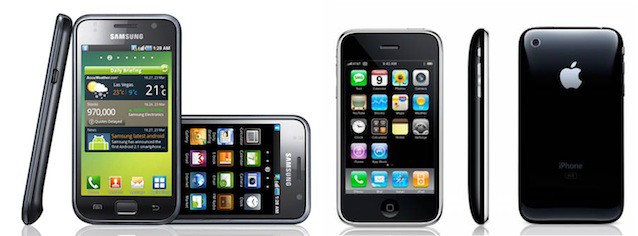The blogosphere is seething today with theories about why Apple is suing Samsung, one of its key suppliers and partners.
It’s been suggested that Apple has little interest and chance of winning a “look and feel” lawsuit, otherwise known as “trade dress.” It’s a tactical move, a way to win concessions from either Samsung or Google. Silicon Alley Insider, for example, says it’s to force Google to charge hardware makers for Android, which is currently free.
But the real reason is this: Apple is pissed off with getting ripped off. And it has a good chance of winning, because it has won several trade dress lawsuits before.


As is often the case with Apple, the company has explained itself in simple and direct terms. Yesterday Apple’s PR department put out a statement that said, essentially, the company is tired of getting ripped off.
“It’s no coincidence that Samsung’s latest products look a lot like the iPhone and iPad, from the shape of the hardware to the user interface and even the packaging. This kind of blatant copying is wrong, and we need to protect Apple’s intellectual property when companies steal our ideas.”
For some reason, a lot of pundits are loath to take Apple at face value. Perhaps it’s the company’s penchant for secrecy and obfuscation (remember when Steve Jobs said the iPod would never do video, just before the iPod did video?).
But in my experience, Apple and Steve Jobs are often quite truthful and direct when it comes to explaining motives. Just look at Steve Jobs’ open letter on DRM, or Thoughts on Flash. They quite clearly explain Jobs’ thinking. However, both were greeted by volumes of analysis that misinterpreted his reasoning, second guessed his motives and tended towards the conspiratorial.
There’s nothing underhand about Apple’s suit against Samsung. It’s a straight shot at getting the court to prevent Samsung from selling “blatant” copycat products.
Apple has a history of winning trade dress claims. In the late 1990s, when the fruity see-through iMacs were riding high, Apple won several trade dress claims against companies selling copycat iMacs.
In 1999, Apple sued eMachines, Daewoo and Future Power for knocking off the iMac’s distinctive look and feel. It also launched an investigation against an Australian company, FishPC, for selling a machine similar to the iMac.
Apple won an injunction against eMachines, and settled out of court with Daewoo and Future Power. In all cases, the infringing machines were pulled from the market.
A similar result against Samsung would be huge — but not unprecedented.

Leander Kahney is the editor and publisher of Cult of Mac.
Leander is a longtime technology reporter and the author of six acclaimed books about Apple, including two New York Times bestsellers: Jony Ive: The Genius Behind Apple’s Greatest Products and Inside Steve’s Brain, a biography of Steve Jobs.
He’s also written a top-selling biography of Apple CEO Tim Cook and authored Cult of Mac and Cult of iPod, which both won prestigious design awards. Most recently, he was co-author of Cult of Mac, 2nd Edition.
Leander has been reporting about Apple and technology for nearly 30 years.
Before founding Cult of Mac as an independent publication, Leander was news editor at Wired.com, where he was responsible for the day-to-day running of the Wired.com website. He headed up a team of six section editors, a dozen reporters and a large pool of freelancers. Together the team produced a daily digest of stories about the impact of science and technology, and won several awards, including several Webby Awards, 2X Knight-Batten Awards for Innovation in Journalism and the 2010 MIN (Magazine Industry Newsletter) award for best blog, among others.
Before being promoted to news editor, Leander was Wired.com’s senior reporter, primarily covering Apple. During that time, Leander published a ton of scoops, including the first in-depth report about the development of the iPod. Leander attended almost every keynote speech and special product launch presented by Steve Jobs, including the historic launches of the iPhone and iPad. He also reported from almost every Macworld Expo in the late ’90s and early ‘2000s, including, sadly, the last shows in Boston, San Francisco and Tokyo. His reporting for Wired.com formed the basis of the first Cult of Mac book, and subsequently this website.
Before joining Wired, Leander was a senior reporter at the legendary MacWeek, the storied and long-running weekly that documented Apple and its community in the 1980s and ’90s.
Leander has written for Wired magazine (including the Issue 16.04 cover story about Steve Jobs’ leadership at Apple, entitled Evil/Genius), Scientific American, The Guardian, The Observer, The San Francisco Chronicle and many other publications.
Leander has a postgrad diploma in artificial intelligence from the University of Aberdeen, and a BSc (Hons) in experimental psychology from the University of Sussex.
He has a diploma in journalism from the UK’s National Council for the Training of Journalists.
Leander lives in San Francisco, California, and is married with four children. He’s an avid biker and has ridden in many long-distance bike events, including California’s legendary Death Ride.
You can find out more about Leander on LinkedIn and Facebook. You can follow him on X at @lkahney or Instagram.





19 responses to “The Real Reason Apple Is Suing Samsung”
Again, COM, please proofread your posts ;) “In both cases, Appel won injunctions”
One could say Apple doesn’t have to stop at Samsung. So many Android features are direct copies of those found on iOS. From the evidence Apple has put forward on this case, I can see why they went after Samsung.
It’s a dangerous move though, because Samsung is one of their biggest suppliers. But, at the same time, Apple is one of Samsung’s biggest customers, so they may not be so willing to cut Apple off over a lawsuit.
Starting with Samsung was a wise, considered choice. Samsung has many reasons to blink on this. And Apple can show that it has always dealt with Samsung even-handedly in all things.
Hey, give me a break, Apple! And all your KoolAid drinking Fanbois Steve worshipers! They changed lots. They…um…moved the digital clock from the center to the right! They…reversed the little nubby thingy on the battery charge indicator so it points the other way! They made the signal strength bars a tiny bit taller and less wide. They… made it a teeny bit bigger! They…changed the time on the analog clock app icon! They… oh crap, okay, it’s a blatant ripoff.
Project much?
Yeah, I do. Projects, projects, projects. It’s I seem to do. If it ain’t work, it’s the house or the yard or the car.
*It’s ALL I seem to do.
I guess, Apple is trying too hard to make us believe they are the only ones driving technology and innovation. I like Apple products, and seems that this time they have a point against Samsung. They look very similar.
the previous post about the Samsung music player design is similar to of iPhone so the lawsuit can be reversed as well as for now….
but the reason for this step from Apple is about the supremacy at the top of smartphone
the “real” reason is that if they let Samsung get away with it ANYONE can get way with it. its not like Samsung is going to sue over a lookalike from another company. Within 2 years every loser phone maker will have an iPhone lookalike.